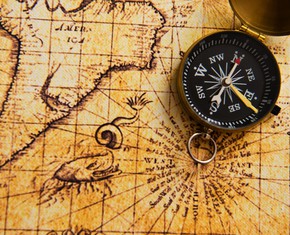The views expressed in our content reflect individual perspectives and do not represent the authoritative views of the Baha'i Faith.
The divine religions were founded for the purpose of unifying humanity and establishing universal peace. – Abdu’l-Baha, The Promulgation of Universal Peace, p. 97.
Human beings have always longed for a sense of purpose. We have ever been in search of the meaning of existence. We have always wanted to love and to be loved. We have always dreamed of peace. This is no less true today than in ancient times.
The twentieth century was born at a time when the forces of modernism were swiftly gaining momentum. Scientific, political, and cultural advances of that day contributed to an overwhelming sense that humanity was entering a new era. With these discoveries came not only hope for dramatic and uninterrupted progress, but also new philosophies, at the center of which stood man himself.
 Humanity was now, according to emerging thought, unloosed from the shackles of past traditions and dogmas, free to discover truth, and firmly in control of its destiny. In the conviction that happiness and prosperity were at long last within the reach of every individual, the pioneers of that age, especially in Europe and America, poised themselves to spread the benefits of enlightened civilization across the earth.
Humanity was now, according to emerging thought, unloosed from the shackles of past traditions and dogmas, free to discover truth, and firmly in control of its destiny. In the conviction that happiness and prosperity were at long last within the reach of every individual, the pioneers of that age, especially in Europe and America, poised themselves to spread the benefits of enlightened civilization across the earth.
But today, we know that the Modern Age has been a mixed blessing. In spite of humanity’s many marvelous achievements, the fundamental goal of a peaceful and just society still seems to lie beyond our reach. Although conditions have certainly improved for many people, the vast majority of the world still languishes in desperate poverty while a few enjoy luxuries such as the Caesars could not have imagined. The very advances that have transformed the planet into a “global village” have also exacerbated age-old tensions between nations, religions, and ethnic groups; and have provided the means for rivals to deal with each other on a scale so vast and by means so brutal as could scarcely have been imagined in a previous age. To these tensions can be added a steadily rising environmental destruction whose ultimate consequences, if the trend is not reversed, are dreadful to contemplate.
 The ironies of modern life are present also in the nations that have gained the most. In the United States, for example, the top strata of society enjoy a standard of living and a level of personal freedom unparalleled in history. Yet a large proportion of the country’s citizens seem perpetually excluded from this prosperity.
The ironies of modern life are present also in the nations that have gained the most. In the United States, for example, the top strata of society enjoy a standard of living and a level of personal freedom unparalleled in history. Yet a large proportion of the country’s citizens seem perpetually excluded from this prosperity.
The crimes and abuses that abound in our society touch every household, and the prevalence of mental and emotional disorders demonstrates that material well-being alone is no guarantor of happiness. In this young 21st Century, an increasing number of thoughtful people are realizing that the Modern Age might just as aptly be labeled the Age of Frustration.
History has shown that the moral aspects of civilization do not automatically progress hand-in-hand with the material ones. More and more thinkers admit that science does not, after all, address inner spiritual needs. Even the most advanced and progressive political systems can go only so far in ensuring justice—in other words, morality cannot be legislated. And education, for all its value, does not equal wisdom if it does not include the moral dimension. Moreover, we are presented with a chaos of choices in the form of countless religions, creeds, political movements, and other belief systems, each laying claim to solutions for the issues of human happiness. In many respects we seem no closer than we ever were to the ideal of universal human prosperity.
Clearly, the world needs a common ethical center. Humanity must have a frame of reference that ministers to practical and spiritual needs and that balances individual freedom with social responsibility. We need a unifying moral force that provides the collective will necessary to address, once and for all, the problems that threaten not only our well-being but also our very existence.
Not long ago it was generally assumed among Western leaders of thought that religion was destined to die out as society advanced. For them religion was a relic of an ignorant and superstitious age, neither compatible with scientific reality nor in keeping with the needs of the times. In addition, there were and still are abundant examples of the destructive influence of religion carried to extremes.
However—the idea of religion is now being reexamined. Increasingly, many acknowledge that, religious fanaticism notwithstanding, religion is a powerful force for good. Many have observed that most religions have certain essential aspects in common. All cultivate a sense of the transcendent, offer meaning and value to human life, and uphold an essentially universal set of moral and ethical values.
Yet no particular creed seems capable, in and of itself, of reconciling the vast diversity of humanity into the kind of moral system of which the world is now in dire need. The world needs a universal spiritual vision, with practical effects, that can provide both the continuity and the adaptability required for an age of transition.
The Baha’i Faith offers just such a vision. It provides answers to the hopes and expectations of countless philosophers, teachers, and religious leaders of the past and the present. It demonstrates that the promises in the sacred scriptures of the great religions of the world—promises of a day when justice and righteousness would be firmly established— are true and are now being fulfilled. It reaffirms that humanity has a destiny, that there is a God Who cares about us and has provided a way to achieve universal peace and salvation.
To order Gods Speaks Again by Kenneth E. Bowers
















Comments
Sign in or create an account
Continue with Googleor